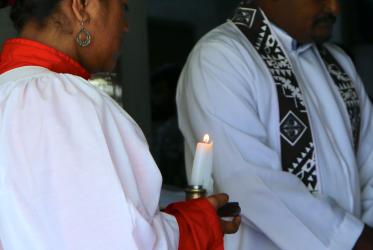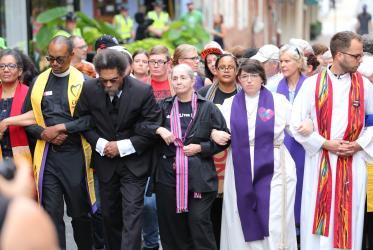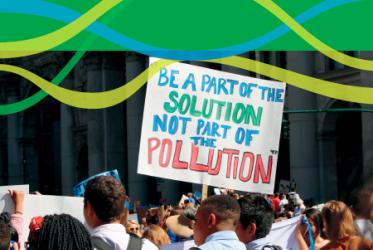in the framework of a panel discussion on
"Process of reform and change of the governance of the International Monetary Fund and the World Bank"
23 April 2004, Washington, D.C., United States
It is a great privilege and responsibility to represent the World Council of Churches (WCC) in this important panel. Its churches represent over 400 million believers in the world, of whom the majority are suffering under poverty.
The World Council of Churches' concern on economic justice is based on lack of power sharing in powerful economic and financial institutions in the world. It believes that only a true democratization of all aspects of power can make the market, finance and related institutions, perform their proper role in societies. The international ecumenical movement has for years criticized the lack of economic democracy, flagrant international inequality in the distribution of income, knowledge, power and wealth. So, power within the International Financial Institutions must be distributed following the ideals of democracy.
At one of the WCC/WB/IMF encounters held in October 2003 in Washington DC, the WCC concluded, "On institutional governance and accountability, the democratic deficit in the governance of the international financial institutions (IFI) and the necessity for reforms to make the IFIs more democratic and accountable were commonly acknowledged. A number of changes are currently underway and are very much appreciated, but these changes are not deep enough and more work has to be done in this area. In particular, the voice and representation of developing countries in the governance structures of the IFIs have to be expanded and strengthened." This is the main purpose of my presentation. I will first begin by citing the case of Latin America.
In 1982 Francois Miterrand said, "We are moving toward a world of small islands of prosperity in a sea of misery."
Unfortunately those words have become reality, and even those organizations such as the International Monetary Fund and the World Bank, which were created to benefit the development of nations, have failed to fulfill their purpose.
We must remember that one of the purposes of the Bank is
"To facilitate the expansion and balanced growth of international trade, and to contribute thereby to the promotion and maintenance of high levels of employment and real income and to the development of the productive resources of all members as primary objectives of economic policy".
Today the policies of organizations do not promote human development but rather lead to a continual and greater concentration of wealth and power among the eight powerful nations. As a result the poor and dependent nations suffer an increase in their impoverishment since the transfer of their economic resources continues to be used to service their external debt. In addition they suffer from the exodus of millions of persons who today offer their training and skills to the North. Thousands of them are highly trained in the areas of science and technology.
From the perspective of Christian faith, the unjust and unequal international economic order, which certainly has serious human consequences for millions of people, has theological implications for the member churches of the WCC, and constitutes a challenge for a profound change in these organizations, beginning with its composition, structure and decision-making.
I come from Latin America where approximately 250 million persons suffer exclusion and poverty, the majority children. On the other hand it is a region where natural resources abound which benefit the richest nations of the world since 1492 when Christopher Columbus came from Spain to conquer the region.
This situation is not accidental but is the result of a well-developed political-economic-military plan which has resulted in moving our countries into an enslaving dependency., The external debt has particularly caused this reprehensible system.
For example, in 1976 at the beginning of the military government in Argentina, the debt was 7,8 billion dollars. When it ended in 1983 the debt had increased to 45,1 billion.
In 1975 the external debt in Latin America and the Caribbean was 69 billion dollars. Since then 795 billion were paid as services of the debt . Today the debt is more than 750 billion dollars.
Mathematically incomprehensible. The more we pay the more we owe and the poorer we become.
This is not just a financial problem, it is also an inhuman situation which has resulted in exclusion and death, especially among children, women, indigenous communities and the descendents of African slaves.
Today the world scene reveals this panorama: For decades the non-governmental organizations and the religious organizations have operated programs of nutrition and support which have served persons from the excluded sector of society - those who suffer the consequences of the decisions which are made in the centers of world economic power. These centers, in the North make their decisions based on financial interests while the religious and social organizations try to bind up the wounds they cause.
How long will this serious situation of injustice continue? A situation which permits on one hand limitless concentration of wealth and on the other continued impoverishment of communities and nations?
From the South we ask for a change in the structures of the International Monetary Fund and the World Bank for important reasons :
1. Human:
The present situation means life or death for millions of persons. In Latin America one half of the deaths are children under the age of five who have lost their lives as a result of malnutrition and disease.
In addition 250 million people, approximately fifty percent of the population, as a result of low levels of employment and income, live on a level of poverty and misery with the serious consequences of violence and deterioration of education, health, development and family relations, that this implies.
2 - Ethical
A great majority of the debts are the result of loans made to illegitimate Government such as the military governments in the decades of the seventies and eighties.
Those governments which served the powerful international economic interests caused the disappearance of more than one hundred twenty thousand persons in the Latin American Region and benefited from the loans, which today the democrat governments must continue paying. Ethically this operation is reprehensible.
Forgiving the debts, which were created by those governments with the approval of the IMF and the World Bank, would be a decision which would indicate that they are now in favor of a change.
3 - Just
The structure and make-up of the IMF and the World Bank exhibit an obvious inequality that impedes wider participation, particularly by the regions of the South because of its composition and then its decision-making process. Yet those countries are the ones most affected in their economic situation, their political liberty, their social situation and by the decisions made by the economic organizations.
We affirm the urgent need for changes that will defend:
I - Democratization
Voice and vote not based on the wealth and power of the countries, criteria contrary to democracy and favoring the dominion of money instead of the criteria of responsible membership in the organization.
We talk a lot about democracy in the world, however when financial interests are at stake the values of economic power are those that prevail.
We know IMF an WB are financial institutions but, after many years working, it is necessary an evaluation of the situation taking in account the purpose "real income and to the development of the productive resources of all members as primary objectives of economic policy".
II - Participation
a) Equality in the make-up of the governing boards of the organizations which would permit a new direction in decision-making.
It is clear that the eight wealthy nations manage and control all of the actions of the IMF and the World Bank. If there is no change in this representation the time will come, if it has not come already, in which those nations will be responsible for the most massive violation of the economic, social and cultural rights of millions of persons, not only in the poor nations but also in the pockets of poverty in the wealthy ones.
b) We ask for some kind of structure whereby the debtors have voice and vote in the decision-making. At the same time the opinion of Religious and Non-Governmental Organizations should be guaranteed, given their very important role in their solidarity with those who suffer the consequences of this unequal situation.
III- Equity
The injustice of the lack of a vote for the majority of the dependent nations is aggravated by the fact that the wealthiest nation in the world has the right of veto when its interests are affected. This is transformed into a very unjust privilege which can eventually have serious consequences.
At the same time the inequality is evident in the fact that Europe has the exclusive right to elect the head of the IMF and the United States that of the World Bank. Those decisions exclude the democratic possibility of these important officials being elected by an open and transparent process whereby a person from every member country has the right to be a candidate for election.
This lack of equity is also seen in the constant pressure, which the democratic governments experience, to set up a series of economic adjustments. Argentina, my country, constantly suffers from this pressure and each visit of a delegation from the IMF constitutes a direct threat to the already insecure economic stability that has been achieved and an indirect intervention in the internal affairs of the country. The premise of non-intervention in the internal affairs of a country has long been forgotten.
If we look to Latin America today, all of the countries are being pressured to participate in the creation of the American Free Trade Association, a proposal that hides a total lack of equity in international trade behind the word "Free." The hard line of the United States in continuing to maintain subsidies for its products is one example of this lack of equity.
IV- Transparency
The IMF and the World Bank have "arms" to cover areas which are outside their mandate.
This methodology of work usurps the mandate of other multinational institutions.
It is also necessary to renegotiate the agreements of relationships between the IMF, the World Bank and the United Nations in order to clarify the responsibilities of both financial organizations in regard to the UN.
Before I close I want to point out that Argentina as a nation, was a "very good student" in doing the "homework" assigned by the IMF, especially during the government of Dr. Carlos S. Menen. However in that time frame from 1990 to 1999 the debt grew by 81 billons dollars. In this same period the result of the privatization of State-owned enterprises reached approximately 30 billions dollars.
This "good student" nation reached the point of losing the support of the IMF and literally "fell into a bottomless pit" in December 2002. The political system trembled, we had five presidents in 10 days, dozens of deaths occurred because of repression, the banking system froze the deposits of the people and the entire economy was in chaos.
In closing, I leave some questions.
1. Is change possible for the International Monetary Fund and the World Bank? or is all of this merely "word games"? Today human rights are systematically violated by the interests of the large monopolies of business and poorness nations.
2. Will the time come when LIFE will be placed above economic and financial interests?
From the WCC we are looking to a new way of Financial Institutions. These institutions should be less ideological, less bureaucratic, more flexible, and more pragmatic. They should pay special attention to an economy which principally serves the welfare of all people and be an economy which generates work rather than hunger, and education and development rather than exclusion. The challenge is to have a new vision in which life is worth living.
To reach that goal, change is urgently needed, which will result in a situation where democracy, equal participation and justice are fully evident.
The International Founds Institutions demand good governance and democracy in developing countries. They should equally demonstrate themselves that they are democratic.
* Bishop Emeritus Aldo M. Etchegoyen of the Argentine Evangelical Methodist Church is general secretary of The Council of Methodist Churches in Latin America and the Caribbean, member of the Central Committee of the World Council of Churches, and co-president of the Permanent Assembly for Human Rights in Argentina.



